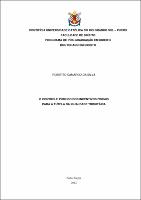| Share record |


|
Please use this identifier to cite or link to this item:
https://tede2.pucrs.br/tede2/handle/tede/4208| Document type: | Tese |
| Title: | O controle público dos incentivos fiscais para a tutela da igualdade tributária |
| Author: | Silva, Roberto Camargo da  |
| Advisor: | Silveira, Paulo Antônio Caliendo Velloso da |
| Abstract (native): | A igualdade é um direito fundamental ameaçado pela obscuridade das relações, especialmente quanto aos sujeitos, objetos, requisitos e, principalmente, às consequências dos atos praticados. Somente uma publicidade adequada permite as reações contra ofensas ou ameaças à igualdade. Sem informação não há controle possível. Sem controle, surge uma suspeição quanto à possibilidade de a relação estar respeitando o tratamento igualitário das partes e de terceiros interessados. Tratando-se de relações jurídicas, o controle público é essencial para a validação frente ao sistema normativo que tutela a igualdade. Uma igualdade substancial depende de informações a serem disponibilizadas para o maior público possível, no tempo certo e de forma clara, precisa e estruturada. Essa perspectiva deve ser mais ampla possível nas relações jurídicas que tenham a participação do Estado já que os poderes constituídos nas três esferas de governo têm o dever constitucional de preservar e promover a igualdade de tratamento entre os cidadãos. No âmbito tributário, particularmente em relação aos incentivos fiscais, as ameaças à igualdade que surgem devem ser inibidas via controle público não somente da legislação desonerativa que venha a ser editada, que necessariamente deverá obedecer aos requisitos formais e materiais constitucionalmente previstos, mas, inclusive, dos efeitos derivados, já que as desigualdades podem surgir em momento posterior à entrada em vigor das normas reguladoras. Na realidade brasileira essas ameaças à igualdade tributária na concessão de incentivos fiscais derivam do déficit de transparência fruto de insuficientes referências objetivas que possam orientar um controle público, o que compromete a eficácia dos respectivos atos normativos. Para colaborar na superação dessa carência esse trabalho visa a disponibilizar parâmetros objetivos que, além de qualificarem o exercício da cidadania, podem servir de apoio para a definição das políticas públicas desonerativas e para o controle oficial legalmente previsto colaborando para o encontro da efetividade das normas constitucionais que tutelam a igualdade. |
| Abstract (english): | Equality is a fundamental right threatened by the obscurity of relations, especially regarding subjects, objects, requirements and principally by the consequences of the acts committed. Only adequate publicity allows the reactions to offenses or threats to equality. Without information there is no possible control. Without control, a suspicion arises as to whether the relationship is respecting the equal treatment of the parties and interested third parties. In the case of legal relations, public control is essential for the validation begore the regulatory system that oversees equality. Substantive equality depends on information made available to the widest possible audience, at the right time and in a clear, accurate and structured form. This perspective should be the widest possible in legal relationships that have the participation of the State since the constituted powers in the three spheres of government have a constitutional duty to preserve and promote the equal treatment of citizens. Under tax law, particularly in relation to tax incentives, arisen threats to equality must be inhibited via public control not only by relief legislation that will be edited, which necessarily must comply with the formal requirements and materials provided constitutionally, but even effects of derivatives, since inequalities may arise in time after the entry into force of regulatory standards. In the Brazilian reality these threats to equal taxation in granting tax incentives are derived from the transparency deficit caused by insufficient objective references that can orientate public control, which compromises the effectiveness of their normative acts. To assist in overcoming this deficiency this work aims to provide objective parameters that besides qualifying the exercise of citizenship, can serve as support for the definition of public relief policies and for the official control legally referred to the meeting of the effectiveness of constitutional norms that safeguard equality. |
| Keywords: | DIREITO TRIBUTÁRIO INCENTIVOS FISCAIS PRINCÍPIO DA IGUALDADE |
| CNPQ Knowledge Areas: | CNPQ::CIENCIAS SOCIAIS APLICADAS::DIREITO |
| Language: | por |
| Country: | BR |
| Publisher: | Pontifícia Universidade Católica do Rio Grande do Sul |
| Institution Acronym: | PUCRS |
| Department: | Faculdade de Direito |
| Program: | Programa de Pós-Graduação em Direito |
| Citation: | SILVA, Roberto Camargo da. O controle público dos incentivos fiscais para a tutela da igualdade tributária. 2012. 31 f. Tese (Doutorado em Direito) - Pontifícia Universidade Católica do Rio Grande do Sul, Porto Alegre, 2012. |
| Access type: | Acesso Aberto |
| URI: | http://tede2.pucrs.br/tede2/handle/tede/4208 |
| Issue Date: | 21-Dec-2012 |
| Appears in Collections: | Programa de Pós-Graduação em Direito |
Files in This Item:
| File | Description | Size | Format | |
|---|---|---|---|---|
| 446220.pdf | Texto Parcial | 738.1 kB | Adobe PDF |  Download/Open Preview |
Items in DSpace are protected by copyright, with all rights reserved, unless otherwise indicated.




